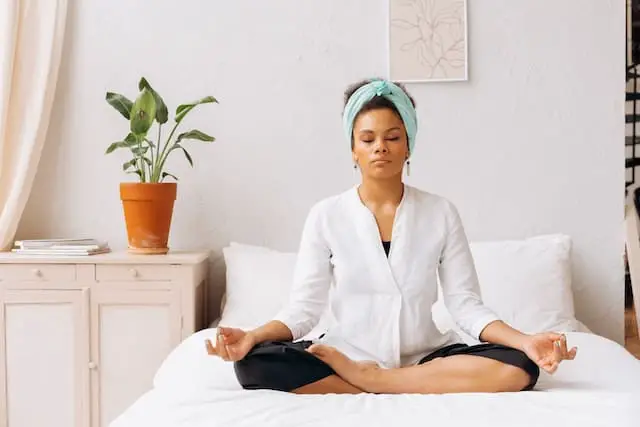Can you meditate in bed? Are you struggling to find a comfortable spot to meditate? Do you often feel like getting up from your bed just seems too daunting of a task? Well, good news! You can meditate in bed. Yes, it is possible and even encouraged by many meditation experts.
In fact, for some people, meditating in bed can be the most comfortable and soothing way to practice mindfulness. It allows you to start off your day or wind down before sleep without having to leave the comfort of your own bed. Plus, it’s a great way to incorporate mindfulness into your daily routine without adding an extra step or location change.
So let’s explore the healing power of meditation.
Can You Meditate in Bed?
Feeling too cozy to get up? No problem, reaping the benefits of meditating in bed is totally doable. In fact, it may even be better for you than meditating in a more traditional setting.
When you’re lying in bed, your body is already relaxed, making it easier to focus on your breath and clear your mind. Plus, there’s no need to worry about finding a comfortable position since you’re already in one!
Meditating in bed can also help improve the quality of your sleep. By taking some time to relax before drifting off, you’ll be able to quiet the racing thoughts that oftentimes keep us up at night. Additionally, if you suffer from insomnia or other sleep disorders, meditating in bed can help calm your nervous system and promote relaxation.
To make the most out of meditating in bed, it’s important to create a calm and peaceful environment. This means turning off any electronics that may distract you and finding a comfortable pillow or cushion for support. Consider lighting some candles or using essential oils like lavender to create a soothing atmosphere.
With these simple adjustments, meditating in bed can become an incredibly rewarding experience that helps improve both your mental and physical health.
Creating a Calm and Peaceful Environment

Eliminate distractions by turning off your phone or TV and finding a quiet space to relax.
Use soothing sounds or scents, such as soft music, essential oils, or candles, to create a calming atmosphere.
Adjust the lighting in your room by using dimmer switches or warm-toned bulbs to promote relaxation and reduce eye strain.
Double new line.
Eliminate Distractions
To create a peaceful environment for your mind to relax, remove any potential interruptions from your surroundings while settling into a comfortable position. This means turning off or silencing your phone and any other electronic devices that may cause distractions. It’s also helpful to choose a room with minimal noise levels, such as closing windows or doors if necessary.
Another key element in eliminating distractions is organizing your thoughts beforehand. If you have pressing issues on your mind, try jotting them down in a notebook or setting aside time earlier in the day to address them. By doing this, you can ease your mind and avoid being overwhelmed during meditation.
Remember, the goal is to create an environment where you can focus solely on the present moment without outside interference.
Once you’ve created an interruption-free zone, it’s time to enhance the atmosphere with soothing sounds or scents that will aid in deepening relaxation.
Use Soothing Sounds or Scents
Enhance your meditation experience by adding calming scents or sounds that’ll transport you to a tranquil state of mind.
You can light some candles with your favorite essential oils, such as lavender, chamomile, or peppermint. These scents have been known to promote relaxation and reduce stress levels.
Alternatively, you can use an oil diffuser or room spray to create a soothing atmosphere in your bedroom.
Aside from scents, soothing sounds can also help improve your meditation practice while lying in bed. You can play some gentle music like classical, jazz, or nature sounds to calm your mind and block out any distracting noise around you.
This way, you can fully focus on being present in the moment and let go of any thoughts or worries that may be lingering in your head.
Remember that the goal is to create an environment that encourages peace and tranquility during meditation.
To further enhance the ambiance of your bedroom for meditating purposes, adjusting lighting is another important factor worth considering.
Adjust Lighting
Dimming the lights in your bedroom can create a more conducive atmosphere for achieving a meditative state, allowing you to fully embrace the peacefulness of the moment.
Bright lights can be distracting and may make it difficult for you to focus on your breathing or visualization exercises.
By dimming the lights, you can create a calming environment that promotes relaxation and helps you to let go of any stress or tension from your day.
It’s important to note that while dim lighting is beneficial for meditation, complete darkness may not be ideal as it could make you feel uneasy or anxious.
Experiment with different levels of lighting until you find what works best for you. You may also want to try using candles or soft lamps instead of harsh overhead lighting to further enhance the ambiance of your meditation space.
Tips for Successful Bed Meditation

Curl up under your warm blankets, relax your body and mind, and let the peacefulness of bedtime meditation wash over you. Meditation in bed can be a great way to end your day and prepare for restful sleep. However, it’s important to make sure that you’re not just lying there with racing thoughts. Here are some tips for successful bed meditation:
| Tip | Description | Benefit |
|---|---|---|
| 1. Choose a focal point | Focus on something specific like your breath or a calming image | Helps calm the mind and reduce distractions |
| 2. Set an intention | Decide what you want to focus on during your meditation such as gratitude or relaxation | Gives purpose to your practice |
| 3. Use guided meditations | Listen to recordings that guide you through the practice | Can help beginners stay focused |
Remember that everyone’s experience with bedtime meditation will be different, so don’t get discouraged if at first it feels challenging or unproductive. Keep practicing and experimenting until you feel the benefits of meditation.
Meditating in bed can be a wonderful addition to your nighttime routine, helping to ease stress and promote better sleep quality. By following these tips for successful bed meditation, you’ll be able to fully enjoy the benefits of this practice and wake up feeling refreshed and rejuvenated each morning. So go ahead – snuggle down into those cozy blankets and let yourself drift off into peaceful relaxation!
Frequently Asked Questions
What are the common mistakes people make when meditating in bed?
When it comes to meditating in bed, there are a few common mistakes that people make.
First and foremost, many people get too comfortable and end up falling asleep instead of fully engaging in their meditation practice.
Additionally, the softness of the mattress can sometimes lead to poor posture, which can cause discomfort or even pain over time.
It’s also important to create a peaceful environment free from distractions like electronics or noisy surroundings.
By avoiding these mistakes and focusing on creating a serene space for meditation, you can fully embrace the benefits of your practice.
Can meditating in bed help with insomnia?
Do you struggle with insomnia and find it difficult to fall asleep at night? You’re not alone. Many people experience sleepless nights, which can impact their overall health and well-being.
But did you know that meditating in bed may help alleviate your insomnia? By practicing relaxation techniques such as deep breathing or visualization before bedtime, you can calm your mind and body, promoting a more restful night’s sleep.
So next time you find yourself tossing and turning in bed, try incorporating meditation into your bedtime routine for a peaceful slumber.
How long should I meditate in bed for optimal benefits?
To reap the optimal benefits of meditation, it’s recommended that you meditate for at least 10-20 minutes per session. However, the key to successful meditation lies not in the duration but in consistency. It’s better to practice shorter sessions regularly than longer sessions sporadically.
The ideal time to meditate in bed would be just before sleep or right after waking up, as it can help you relax and set a positive tone for your day or night ahead. Just remember to focus on your breath and try not to let any distracting thoughts take over your mind.
With regular practice, you’ll soon start experiencing the numerous benefits of meditation – from reduced stress levels to improved overall well-being.
Is it okay to fall asleep while meditating in bed?
Falling asleep while meditating in bed is a common concern, but it’s important to remember that meditation is about cultivating a state of awareness and relaxation, not necessarily staying awake.
In fact, many experienced meditators encourage falling asleep during practice as a way to promote restful sleep and reduce stress.
So if you find yourself drifting off during your meditation session in bed, don’t worry – simply acknowledge the sensation and gently bring your attention back to your breath or chosen focus point.
Remember, the goal of meditation is not perfection or staying awake at all costs; it’s about finding peace and calm within yourself.
Can I use guided meditations while meditating in bed?
Using guided meditations while in bed is a great way to incorporate meditation into your daily routine. It can be especially helpful if you struggle with falling asleep or have trouble winding down at the end of the day.
With many apps and resources available, you can easily find guided meditations that are tailored to your specific needs, whether it’s stress relief, anxiety management, or simply relaxation. However, it’s important to remember that meditation is a practice that requires focus and intentionality.
So while it may be tempting to let yourself drift off during a meditation session in bed, try to stay present and engaged as much as possible for maximum benefit.
Conclusion

So, can you meditate in bed? The answer is a resounding yes!
In fact, meditating in bed may just be the perfect way to start or end your day. It allows for flexibility and comfort, which can make it easier for beginners or those with physical limitations to establish a consistent meditation practice.
However, it’s important to create a calm and peaceful environment to ensure successful bed meditation. This means minimizing distractions such as bright lights or loud noises and setting an intention for your practice.
With consistent effort, you’ll find that meditating in bed can lead to reduced stress levels, improved sleep quality, and overall mental well-being.
Fun fact: According to a study by the National Institutes of Health (NIH), mindfulness meditation has been found to reduce symptoms of depression by up to 40%. So why not give it a try tonight before drifting off into dreamland?
Remember, establishing a consistent meditation practice takes time and patience, but the benefits are worth it. Happy meditating!

